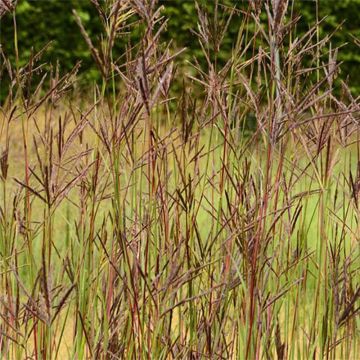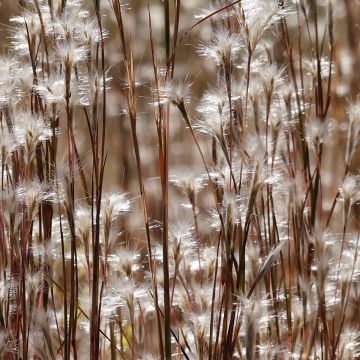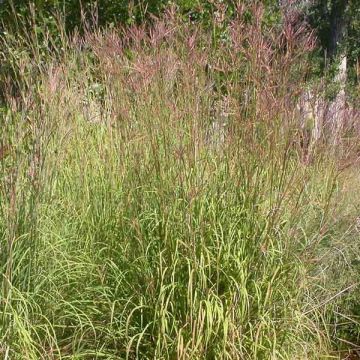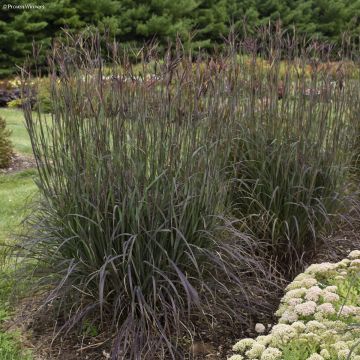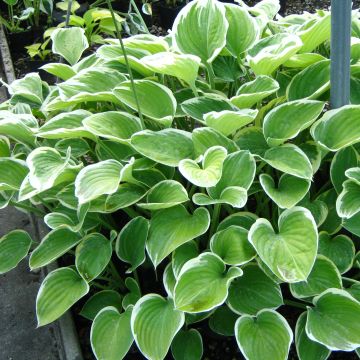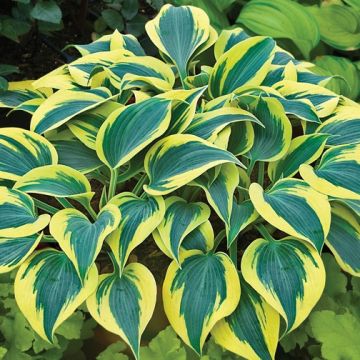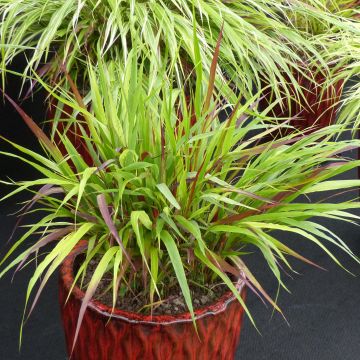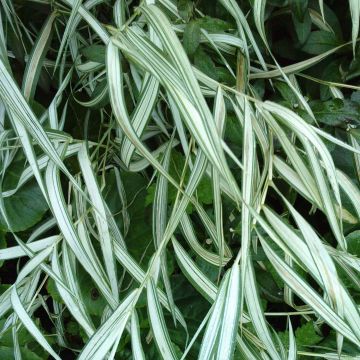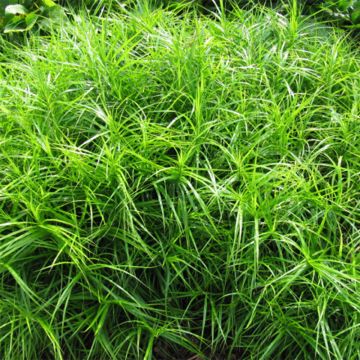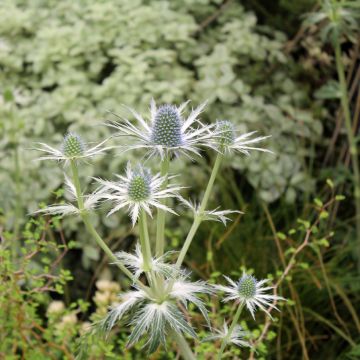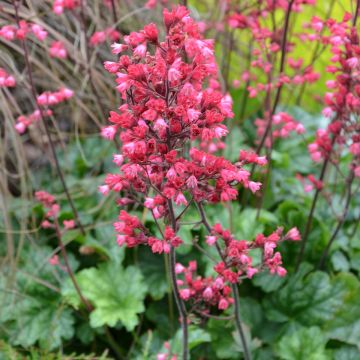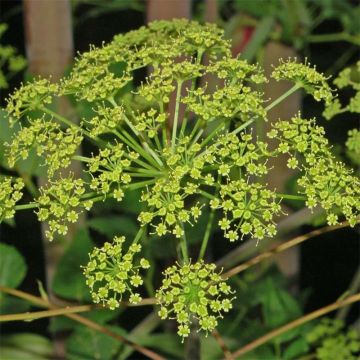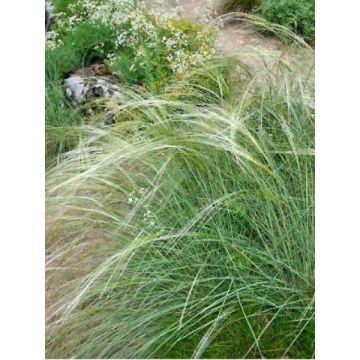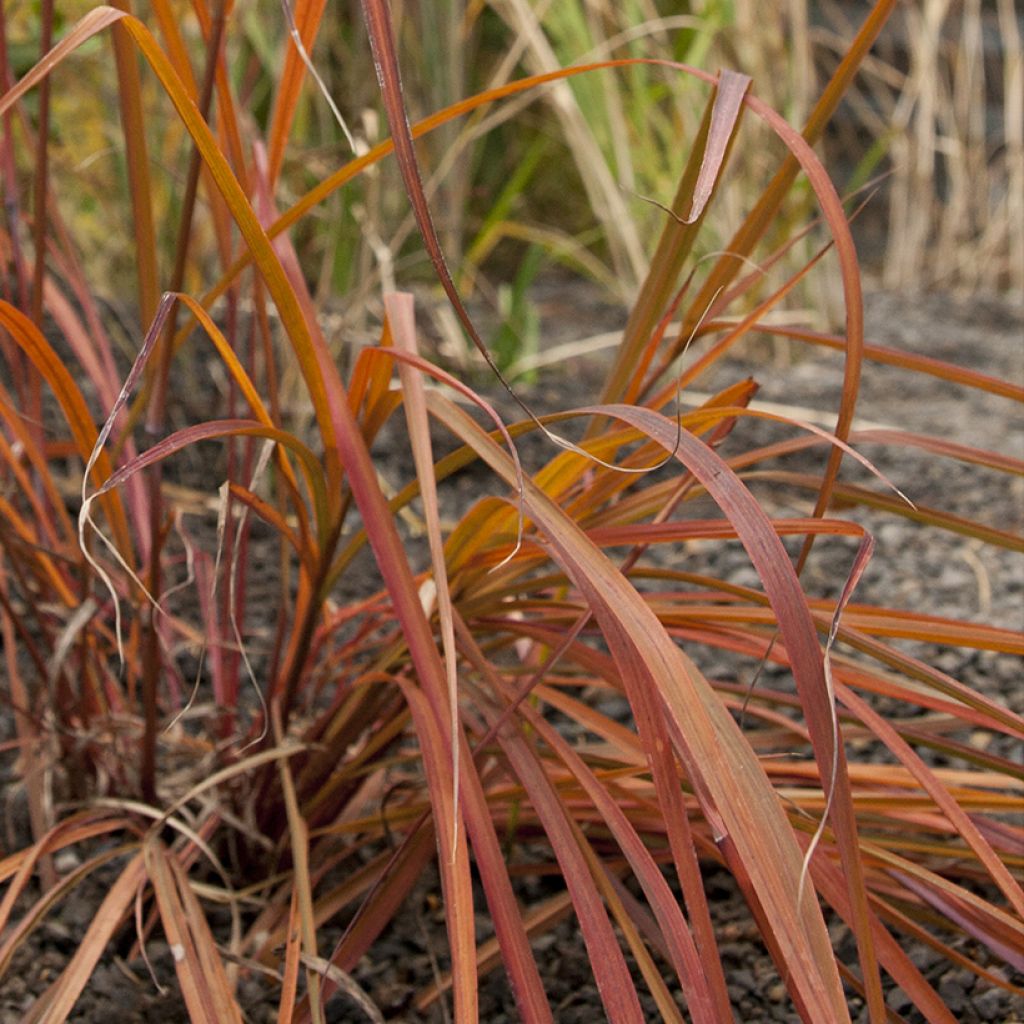

Andropogon gerardii Red October - Barbon de Gerard
Andropogon gerardii Red October
Andropogon gerardii Red October
Big bluestem, Beard grass, Shepherd's beard
This plant carries a 12 months recovery warranty
More information
We guarantee the quality of our plants for a full growing cycle, and will replace at our expense any plant that fails to recover under normal climatic and planting conditions.
From €5.90 for pickup delivery and €6.90 for home delivery
Express home delivery from €8.90.
Does this plant fit my garden?
Set up your Plantfit profile →
Description
Andropogon gerardii Red October is the most red-coloured Shepherd's beard in autumn. With red highlights in spring, this colour intensifies in September to burgundy and ending up in crimson red with the first frosts. It is an upright grass that forms a tufts that are both arching and stiff, from which very airy, rather late flowers emerge in summer, becoming burgundy red at maturity. Resilient to wind, it is stunning in wild-inspired or rustic flower beds with large flowering perennials. It is particularly suitable for vegetating both poor, dry, even barren soils, as well as moist banks.
Andropogon gerardii Red October is a horticultural variety derived from a perennial grass locally called Big Bluestem or Shepherd's Beard. All these plants belong to the Poaceae family, the family of 'true' grasses. Andropogon gerardii is a perennial herbaceous plant, native to the continental regions of the United States. In nature, it is often found in sandy alluvial soils, wet in season, becoming very dry in summer. It is a very hardy species, generally considered the most rewarding among American grasses. This large and very resistant grass is easily cultivated in our gardens. Once deeply rooted, it withstands drought perfectly.
Andropogon gerardii Red October is a non-invasive rhizomatous plant, which is clump-forming. It slowly forms a tight tuft with a vertical but arching habit, just slightly shorter than the species, this variety reaches about 60 cm (24in) in height and 60 cm (24in) in width. Sometimes a little slow to establish, it proves long lasting and vigorous over time. Its stiff and strong stems, called culms, are more or less bluish and bear long and slender flattened leaves whose colour evolves throughout the seasons. In spring, the leaves are deep green with red highlights. In autumn, this cultivar, as its name suggests, offers the reddest shades. Its red hue evolves from September until the first frost, changing from burgundy to crimson red. The flowers occur in August-September, depending on the climate. At the end of the floral stems, silky inflorescences emerge, reaching 1.30 m (4ft) above the ground. These are beautiful floral spikes that can rival other ornamental grasses. The spikes are divided into three distinct strands, giving them the amusing appearance of a chicken foot. Initially yellow-orange in colour, these spikes gradually turn dark red. The deciduous foliage dries up at the end of autumn and regrows in spring.
Very adaptable, Andropogon gerardii Red October tolerates both dry and rocky soils as well as moist to clay soils, but to give its best, this 'beauty of the fields' needs plenty of light. Landscapers appreciate Shepherd's beard for its ornamental qualities, but also for its physiological properties. Its deep root system, which effectively stabilises riverbanks, also enables the plant to withstand dry summers. Its abundant foliage can create visual screens or be used as a background in landscaping. In a large border or flower bed, plant this Andropogon alongside other robust plants that populate the great prairies of North America: Panicums, red Echinaceas, echoing its autumn foliage. Also plant Asters, Helianthus, Verbena bonariensis, Agastaches, or Baptisias. Like all grasses, it is irreplaceable for bringing lightness to neighbouring plants, whether perennials or shrubs.
Report an error about the product description
Flowering
Foliage
Plant habit
Botanical data
Andropogon
gerardii
Red October
Poaceae
Big bluestem, Beard grass, Shepherd's beard
North America
Other Andropogon
Planting and care
Andropogon gerardii Red October accepts both dry and rocky soil as well as moist, even clay soil, but to give its best, this 'beauty of the fields' needs warmth in the summer and sunshine. The important thing is that its deep root system can find moisture. Its cold resistance is excellent. Its resistance to cold is excellent. Help it to establish by providing abundant but spaced out watering, especially in summer if it is very dry.
Planting period
Intended location
Care
This item has not been reviewed yet - be the first to leave a review about it.
Coloured foliage perennials
Haven't found what you were looking for?
Hardiness is the lowest winter temperature a plant can endure without suffering serious damage or even dying. However, hardiness is affected by location (a sheltered area, such as a patio), protection (winter cover) and soil type (hardiness is improved by well-drained soil).

Photo Sharing Terms & Conditions
In order to encourage gardeners to interact and share their experiences, Promesse de fleurs offers various media enabling content to be uploaded onto its Site - in particular via the ‘Photo sharing’ module.
The User agrees to refrain from:
- Posting any content that is illegal, prejudicial, insulting, racist, inciteful to hatred, revisionist, contrary to public decency, that infringes on privacy or on the privacy rights of third parties, in particular the publicity rights of persons and goods, intellectual property rights, or the right to privacy.
- Submitting content on behalf of a third party;
- Impersonate the identity of a third party and/or publish any personal information about a third party;
In general, the User undertakes to refrain from any unethical behaviour.
All Content (in particular text, comments, files, images, photos, videos, creative works, etc.), which may be subject to property or intellectual property rights, image or other private rights, shall remain the property of the User, subject to the limited rights granted by the terms of the licence granted by Promesse de fleurs as stated below. Users are at liberty to publish or not to publish such Content on the Site, notably via the ‘Photo Sharing’ facility, and accept that this Content shall be made public and freely accessible, notably on the Internet.
Users further acknowledge, undertake to have ,and guarantee that they hold all necessary rights and permissions to publish such material on the Site, in particular with regard to the legislation in force pertaining to any privacy, property, intellectual property, image, or contractual rights, or rights of any other nature. By publishing such Content on the Site, Users acknowledge accepting full liability as publishers of the Content within the meaning of the law, and grant Promesse de fleurs, free of charge, an inclusive, worldwide licence for the said Content for the entire duration of its publication, including all reproduction, representation, up/downloading, displaying, performing, transmission, and storage rights.
Users also grant permission for their name to be linked to the Content and accept that this link may not always be made available.
By engaging in posting material, Users consent to their Content becoming automatically accessible on the Internet, in particular on other sites and/or blogs and/or web pages of the Promesse de fleurs site, including in particular social pages and the Promesse de fleurs catalogue.
Users may secure the removal of entrusted content free of charge by issuing a simple request via our contact form.
The flowering period indicated on our website applies to countries and regions located in USDA zone 8 (France, the United Kingdom, Ireland, the Netherlands, etc.)
It will vary according to where you live:
- In zones 9 to 10 (Italy, Spain, Greece, etc.), flowering will occur about 2 to 4 weeks earlier.
- In zones 6 to 7 (Germany, Poland, Slovenia, and lower mountainous regions), flowering will be delayed by 2 to 3 weeks.
- In zone 5 (Central Europe, Scandinavia), blooming will be delayed by 3 to 5 weeks.
In temperate climates, pruning of spring-flowering shrubs (forsythia, spireas, etc.) should be done just after flowering.
Pruning of summer-flowering shrubs (Indian Lilac, Perovskia, etc.) can be done in winter or spring.
In cold regions as well as with frost-sensitive plants, avoid pruning too early when severe frosts may still occur.
The planting period indicated on our website applies to countries and regions located in USDA zone 8 (France, United Kingdom, Ireland, Netherlands).
It will vary according to where you live:
- In Mediterranean zones (Marseille, Madrid, Milan, etc.), autumn and winter are the best planting periods.
- In continental zones (Strasbourg, Munich, Vienna, etc.), delay planting by 2 to 3 weeks in spring and bring it forward by 2 to 4 weeks in autumn.
- In mountainous regions (the Alps, Pyrenees, Carpathians, etc.), it is best to plant in late spring (May-June) or late summer (August-September).
The harvesting period indicated on our website applies to countries and regions in USDA zone 8 (France, England, Ireland, the Netherlands).
In colder areas (Scandinavia, Poland, Austria...) fruit and vegetable harvests are likely to be delayed by 3-4 weeks.
In warmer areas (Italy, Spain, Greece, etc.), harvesting will probably take place earlier, depending on weather conditions.
The sowing periods indicated on our website apply to countries and regions within USDA Zone 8 (France, UK, Ireland, Netherlands).
In colder areas (Scandinavia, Poland, Austria...), delay any outdoor sowing by 3-4 weeks, or sow under glass.
In warmer climes (Italy, Spain, Greece, etc.), bring outdoor sowing forward by a few weeks.

































